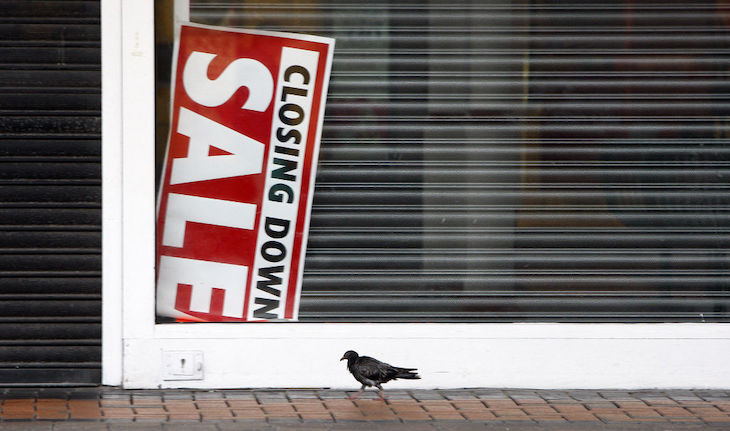Something is stirring. In WhatsApp groups and Westminster pubs, wherever wonks, spads, and other SW1 types gather, there’s a name on everybody’s lips. It’s like John Galt in Atlas Shrugged or Tyler Durden in Fight Club. It’s at once a wail of despair and a call to arms. Who is this man they whisper of? Who is “Nicolas (30 ans)”?
The hard-done-by in society, on this increasingly popular account, are not Barbour-wearing farmers
“Nicolas (30 ans)” is the protagonist of “Le contrat social”, a meme posted onto Twitter, as it then was, in April 2020. It was popularised by a French account which goes by the nom de plume Bouli, after an obscure children’s TV show about a friendly snowman. Bouli’s Nicolas is smartly dressed; he once would have been called a Yuppie. But Yuppies don’t exist anymore and Nicolas holds his head in his hands.
Why is Nicolas depressed? Society is rigged against him; he’s squeezed for all he’s worth. Some of his small salary winds up in the benefits and social housing of “Karim, 25 ans”. Karim, in turn, wires it to relatives in Africa – whom Nicolas already funds in foreign aid. Much of Nicolas’s remaining pittance accrues to the pension of “Bernard and Chantal, 70 ans”, pampered Boomers sipping cocktails as they recline on deckchairs. Nicolas’s hard work subsidises their lavish cruise holidays – not that they, or the cruise companies, would ever think to thank him.
Behold the “social contract” in all its grimness: Nicolas puts in everything and gets nothing in return. In Britain, the picture is similar. The British Nick isn’t likely to need the NHS anytime soon, and by the time he does, there probably won’t even be a state pension for him to fall back on. If his phone or bike gets stolen, the police are unlikely to be of any use. His taxes prop up social housing; what he’s left with is scarcely enough to cover his rent. Of course, the social contract has always had a generational component – the young give and the old take – but in an age of low fertility, high taxation, high immigration, and economic sclerosis, it all seems to be crumbling.
So it’s no surprise that Bouli’s meme struck a nerve, sparking hundreds of imitations. Its popularity exploded last week, giving rise to myriad riffs and parodies. There’s the medieval social contract, the neolithic social contract, and – my personal favourite – the Aberdeen social contract, where Nick’s chips get eaten by a local seagull.
“Nicolas, 30 ans” has entered the lexicon of the underground Right. He features prominently in the offbeat samizdats pored over by terminally-online young politicos, like the freewheeling J’accuse and the more highbrow Pimlico Journal. The meme has a particular resonance in the post-pandemic world: Nicolas, after all, spent much of his twenties under house arrest, in yet another thankless sacrifice for Bernard and Chantal.
The experience which “Le contrat social” describes, with all its righteous resentment, is not universal. It speaks to a specific class, and reflects particular policy failures. Even if the American Nick is ransacked as much as his British or French counterpart, his wages are high enough that he can probably stomach it. And there could be no Danish “social kontrakt”: “Niels” gets a generous student grant and affordable housing. Many British Nicks, meanwhile, are voting with their feet. It is precisely because Britain’s social contract is broken that they’re running off to Dubai.
Nicolas finds his antithesis in another stock figure of British meme-culture, Deano. Unlike Nicolas, Deano is upwardly mobile. For him, the promise of the social contract comes through: he gets his Barratt newbuild, his implants wife, his astroturf garden, his shiny teeth. It helps that he does not live in the city: Deano is a creature of the Home Counties, the spiritual descendant of “Essex Man”. Nicolas’s graduate job requires him to live in London, which, on his salary, he can ill afford. When real-life Nicolas makes memes about Deano, he does so with genuine affection tinged with resentment. It wounds Nicolas’s ego that Deano – who might not even have gone to university – is doing better than him. He feels punished for his ambition. He feels that the universe is mocking him.
Nicolas’s plight challenges popular narratives about Britain’s dysfunction. The hard-done-by in society, on this increasingly popular account, are not Barbour-wearing farmers; they are not the depressed underclasses of the deindustrialised “heartlands”; they are not the “Left Behind” of the “postliberal” imagination. “Levelling Up” has nothing to offer them. Rather, the biggest losers of the “social contract” are young, urban professionals, the productive members of society upon whose shoulders the welfare state rests.
All this brews disaster. “If mainstream politics cannot offer normal people normal homes”, as the writer James Sean Dickson puts it, “normal people look towards the political extremes”. That may well be where Nicolas is looking. In 2022 the thinktank Onward published a report which found young people most likely to favour a “strongman who can ignore parliament”. Yet their proposed remedy was something that would make the whole situation unfathomably worse: national service. The “social contract” looks even less appealing if, after rendering his fiscal dues, Nicolas has to wipe Bernard’s and Chantal’s bottoms in a care home. It is not a “spiritual” crisis that afflicts Britain’s young urban professionals, of the sort that might be redressed with talk of “community” and “cohesion”. Nicolas’s problem is a material one, and liberal democracy will be in peril unless the political establishment starts to attend to it.







Comments